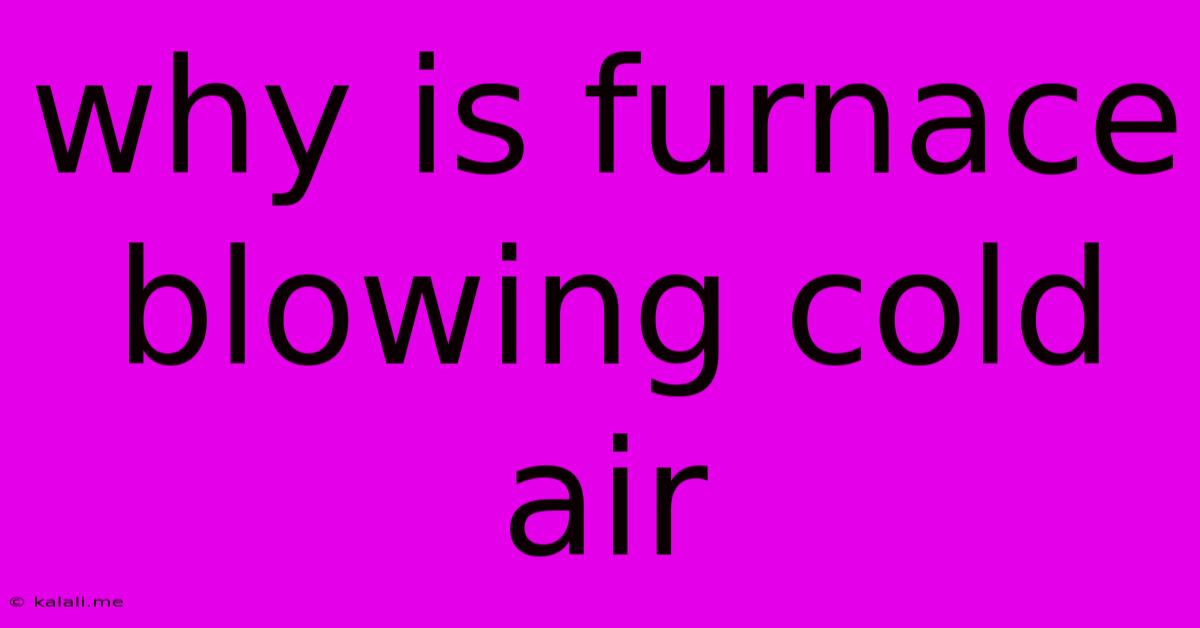Why Is Furnace Blowing Cold Air
Kalali
Jun 02, 2025 · 4 min read

Table of Contents
Why is My Furnace Blowing Cold Air? Troubleshooting Your Heating System
Is your furnace suddenly blowing cold air instead of the warm, comforting heat you need? A cold blast from your heating system can be incredibly frustrating, especially during chilly weather. This article will guide you through the common reasons why your furnace might be blowing cold air, helping you troubleshoot the problem and potentially avoid costly repairs. Understanding the potential causes can help you determine if it's a simple fix you can handle yourself or if you need to call a qualified HVAC technician.
Common Reasons for Cold Air from Your Furnace:
There are several reasons why your furnace might be producing cold air, ranging from simple fixes to more complex issues. Let's explore some of the most frequent culprits:
1. Thermostat Issues: The Simple Check
Before diving into complex mechanical problems, always check the simplest potential culprit: your thermostat.
- Incorrect Settings: Make sure your thermostat is set to "Heat" and the temperature is set higher than the current room temperature. A seemingly minor oversight can be the root cause.
- Dead Batteries: Low or dead batteries in your thermostat can prevent it from functioning correctly. Replace the batteries and see if that resolves the issue.
- Thermostat Malfunction: In some cases, the thermostat itself might be faulty. Try resetting the thermostat by turning it off and on again. If the problem persists, consider replacing it.
2. Air Filter Clogs: A Frequent Culprit
A dirty or clogged air filter is one of the most common causes of furnace malfunctions, including blowing cold air. A clogged filter restricts airflow, preventing the furnace from heating efficiently.
- Check and Replace: Regularly inspect and replace your air filter. A dirty filter will restrict airflow and impact heating efficiency. The frequency of replacement depends on your filter type and the number of people in your home, but generally, replacing it every 1-3 months is a good guideline.
- Blocked Vents: Even with a clean filter, restricted airflow from closed or blocked vents can lead to cold air blowing from your furnace. Ensure all vents in your home are open and unobstructed.
3. Broken Blower Motor: A More Serious Problem
The blower motor is responsible for circulating air throughout your heating system. A faulty blower motor can prevent warm air from being distributed correctly.
- Noisy Operation: A malfunctioning blower motor often exhibits unusual noises, such as grinding, squealing, or humming.
- Complete Failure: In some cases, the blower motor might completely fail, resulting in no airflow at all.
- Professional Repair: This is a more serious issue requiring professional repair or replacement by a qualified HVAC technician.
4. Ignition Problems: Insufficient Heat Production
If your furnace isn't igniting correctly, it won't produce heat. This can be due to several reasons:
- Faulty Igniter: The igniter is responsible for sparking the gas or igniting the heating element. A broken igniter will prevent the furnace from producing heat.
- Gas Supply Issues: Check your gas supply to ensure the gas is flowing to your furnace. A gas leak or a malfunctioning gas valve could be the culprit.
- Pilot Light (Older Furnaces): If you have an older furnace with a pilot light, make sure the pilot light is lit and burning steadily.
- Professional Help: Ignition problems often require professional assessment and repair due to the potential safety hazards involved with gas appliances.
5. Heat Exchanger Cracks: Safety Concerns
A cracked heat exchanger is a serious issue that requires immediate professional attention. A crack in the heat exchanger can lead to the release of dangerous carbon monoxide into your home.
- Carbon Monoxide Detectors: Install and regularly test carbon monoxide detectors in your home.
- Professional Inspection: If you suspect a cracked heat exchanger, immediately turn off your furnace and contact a qualified HVAC technician for a professional inspection and repair. Do not attempt to fix this yourself.
Preventative Maintenance: Avoiding Future Problems
Regular maintenance is key to preventing future cold air issues and ensuring the longevity of your furnace. Consider scheduling annual professional inspections and maintenance to identify and address potential problems before they escalate.
By systematically checking these potential causes, you'll be better equipped to address the issue of cold air from your furnace, ensuring a warm and comfortable home throughout the colder months. Remember that safety is paramount – if you suspect a gas leak or other serious issues, always contact a qualified HVAC technician immediately.
Latest Posts
Latest Posts
-
How To Get Urine Out Of Rug
Jun 04, 2025
-
Why Does Pilot Light Go Out
Jun 04, 2025
-
T Sql Select Result From Stored Procedure
Jun 04, 2025
-
What Block Can Spiders Not Climb
Jun 04, 2025
-
What Are Songs Without Lyrics Called
Jun 04, 2025
Related Post
Thank you for visiting our website which covers about Why Is Furnace Blowing Cold Air . We hope the information provided has been useful to you. Feel free to contact us if you have any questions or need further assistance. See you next time and don't miss to bookmark.